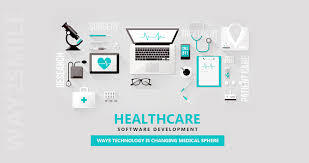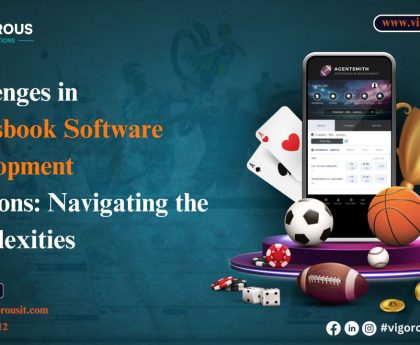The use of artificial intelligence in healthcare is not just a trend. It’s transformative. It’s revolutionizing therapy monitoring, diagnosis techniques, and medication research, empowering doctors to provide superior and quicker treatment. The COVID-19 pandemic has accelerated the adoption of AI in hospitals, where it’s proving invaluable in diagnosing diseases, managing paperwork, and scheduling appointments. Think of it as a super-powered assistant for patients and doctors, ushering in a new era of medical innovation.
Healthcare Software Development
AI is at the forefront of revolutionizing healthcare, serving as a super-smart assistant for doctors and hospitals. It’s not just about analyzing patient data and finding diseases earlier, it’s about recommending personalized treatments that improve accuracy and enable earlier intervention. Hospitals are reaping the benefits, with AI automating tasks like managing patient portals and appointments, freeing up staff for more critical tasks. Patients are the ultimate winners, receiving better care and being more involved in their healthcare journey. This powerful combination of AI and healthcare is paving the way for a future with more accurate diagnoses, smoother hospital operations, and even the development of enhanced, more effective treatments.
AI Is Leading The Way In Healthcare Software Development
AI is not just a theoretical concept, it’s transforming hospital data handling in a tangible way. Hospitals are now able to reduce errors, generate accurate reports, and streamline administrative tasks using AI in healthcare software. This not only saves money but also enhances the overall performance of the healthcare system. AI-powered tools are also taking care of appointments, billing, and medical coding, freeing doctors and nurses to focus on what they do best-patient care.
Additionally, AI can analyze patient data to predict potential health problems and recommend preventative measures. This allows doctors to take a proactive approach to healthcare, leading to better patient outcomes and less paperwork for everyone. Finally, AI can accelerate drug discovery by efficiently identifying potential drug candidates. This can lead to the development of effective medications faster and at lower costs.
Features Of Healthcare Software Development
Billing
Billing is crucial to custom healthcare software, helping providers handle tasks efficiently. It makes managing large amounts of patient data more accessible and ensures accurate regulatory compliance.
This feature allows healthcare companies to use medical billing data effectively and reduce financial waste when working with third-party vendors. Medical billing software collects data from different sources and stores it in a secure, centralized portal, protecting it from breaches. It also reduces errors in pharmacy management and speeds up billing processes, ultimately easing financial operations within healthcare facilities.
Generating Reports
Healthcare software makes generating the reports needed for daily medical operations more accessible. Custom software solutions can analyze past medical data and provide valuable insights for healthcare professionals, helping them assess vital organ functions.
Advanced Healthcare EMR/EHR Software uses machine learning to understand patient data and create relevant reports for treatment planning. These reports help healthcare companies manage resources, track performance, and understand essential metrics, allowing them to stay efficient and optimize their workload.
Tracking Vitals to Monitor Health
Healthcare software simplifies patient information sharing. Integrated medical software allows healthcare organizations to collaborate with other facilities.
Medical experts can quickly share reports and develop better recovery strategies with tracking features. This feature helps doctors monitor patients’ health status more effectively. By improving diagnostic accuracy and timely interventions, healthcare software enhances patient care outcomes. It provides numerous ways for doctors to detect health issues early and give better recommendations based on the patient’s condition. This patient-centric approach to healthcare software development should inspire and motivate software developers, knowing that their work directly contributes to improving patient care.
Benefits of Healthcare Software Development
Boosting Efficiency and Reducing Errors
Custom healthcare software solutions streamline daily tasks like inventory management, billing, and appointment scheduling. This frees up staff time and resources, allowing them to focus on patient care. Additionally, automated features minimize errors in data entry and billing, leading to higher accuracy and smoother workflows.
Enhanced Communication and Collaboration
Integrated communication platforms built into the software facilitate a seamless exchange of information between healthcare professionals. This speeds up decision-making and ensures everyone is on the same page, ultimately improving patient care.
Cost Reduction and Revenue Optimization
Effective healthcare software reduces medical errors and provides doctors with accurate, readily available data. This allows for faster diagnosis, better treatment planning, and fewer financial burdens for patients and providers.
-
The software eliminates the need for expensive infrastructure management.
-
Automated billing and coding systems minimize errors and streamline the revenue cycle, maximizing profits.
-
The software identifies areas for cost reduction by analyzing data patterns.
Improved Patient Care and Treatment Decisions
Healthcare software provides doctors with a centralized platform for storing and accessing patient data, including medical history, medications, allergies, and lab results. This comprehensive view empowers doctors to:
-
Doctors can tailor treatment plans based on individual patient needs.
-
Automated systems minimize human error in data processing and reporting, leading to more accurate diagnoses and treatment decisions.
-
The software can trigger alerts for potential medication side effects, ensuring patient safety.
Data-Driven Insights for Better Management
Advanced analytics features within the software help healthcare professionals detect symptoms, identify trends, and make informed decisions. Hospital administrators can use these insights to:
-
Monitor patient outcomes and operational efficiency and identify areas for improvement.
-
Allocate resources effectively based on patient demand and staffing needs.
-
Anticipate future needs by predicting patient volume and optimizing inventory levels.
How Does CodeSuite Help You Build Healthcare Apps?
CodeSuite is a software development company that helps healthcare businesses build treatment apps. They use the latest technology to create secure and reliable apps that can be customized for each client’s needs. Bigscal can include billing, telemedicine, and electronic health records in your app. They ensure the app works well on different devices and integrates smoothly with your existing systems. Their team of experts builds high-quality apps that improve patient care, make things run smoothly, and bring new ideas to healthcare. They also have thorough testing and deployment processes in place.
Conclusion
Artificial intelligence (AI) is making waves in healthcare by providing doctors with powerful tools for better care. It offers innovative disease treatments, streamlines complex pharmaceutical processes, and improves patient experiences. AI also helps healthcare organizations ensure regulatory compliance, saving them from legal issues while prioritizing patient safety.
Healthcare software development services leverage advanced technology and data-driven insights to empower healthcare organizations. These tools help them improve patient outcomes, deliver high-quality care, and thrive in today’s rapidly evolving healthcare environment.





